I Believe In Father Christmas
That’s right. I, an adult male in my thirties, believe in Santa Claus. I believe in him because I have met him.
Before anyone starts wondering about my sanity, let me clarify. This is not some modern Miracle on 34th Street. I did not meet a jolly fat guy in or out of a big red suit with (or otherwise) a sled of eight reindeer, or nine with Rudolph, or whatever other depictions say. I am not referring to Santa Claus in a literal sense. I am referring to the idea of Santa Claus, or what the English would call Father Christmas.
Santa Claus and Father Christmas are very much alike in popular culture and concept these days, but they are different in origin. Quite so. Santa Claus comes from the Dutch figure Sinterklaas, or Saint Nicholas. This figure was based upon the historical figure of Saint Nicholas of Myra, a real life bishop in the early Christian church. This bishop would do mysterious good deeds for the poor where he lived, in what would become present-day Turkey.
The Dutch took this mythic figure and brought celebrations of his deeds at Christmas time to the Americas in their colonies. When the British Empire conquered the Dutch colony of New Amsterdam and renamed it New York, many Dutch remained as citizens. Various traditions were eventually adopted by the incoming British subjects, most notably that of Sinterklaas, whose name was eventually anglicized Santa Claus. He was still portrayed as a figure quite different and more pious than who we know today.
Eventually, through various media such as newspaper cartoons by Thomas Nast, and the famous poem, “The Night Before Christmas” by Clement Clarke Moore, the popular conception of Santa Claus began to change to the modern image that we see today. This change was further cemented in the 1930’s, thanks to the Coca-Cola Company‘s introduction of Santa Claus on the famous Santa Coca-Cola can.
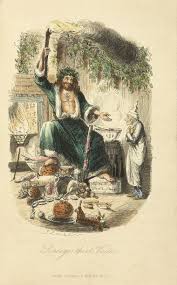 Father Christmas has a slightly different origin. He is the personification of the Christmas Spirit. Early English paintings and works have him as a kind yet pious man who spreads good cheer and helps those in dire straits. This can be seen most directly in the character of “The Ghost of Christmas Present” from Charles Dickens’ A Christmas Carol. The character is very much based upon the idea of Father Christmas, where he helps Ebenezer Scrooge, and spreads good cheer on the people during his Christmas Eve jaunts with Scrooge.
Father Christmas has a slightly different origin. He is the personification of the Christmas Spirit. Early English paintings and works have him as a kind yet pious man who spreads good cheer and helps those in dire straits. This can be seen most directly in the character of “The Ghost of Christmas Present” from Charles Dickens’ A Christmas Carol. The character is very much based upon the idea of Father Christmas, where he helps Ebenezer Scrooge, and spreads good cheer on the people during his Christmas Eve jaunts with Scrooge.
Eventually, aspects of the characters of Father Christmas and Santa Clause influenced each other, and the present versions of the two — very similar to each other — characters that we see today are in use. It should be noted that Father Christmas is still much more regal than Santa Claus, likely owing in part to the Victorian and religious roots of the figure versus the folklore roots (which overcame the religious ones) of Saint Nicholas cum Santa Claus.
The best, in my opinion, version of the combined figure of Father Christmas/Santa Claus is from CS Lewis’ The Lion, the Witch and the Wardrobe, the first book of his Chronicles of Narnia. In the book, a jolly, but serious figure, said to be Father Christmas, gives the characters gifts that range from fun for the Narnians, to serious and essential for the Pevensie children. He is about heralding a season and time of blessing and joy, as Aslan has come and broken the White Witch’s spell. In a very real way, Father Christmas has always been seen as heralding the coming of the Christmas season where we celebrate the birth of the Messiah, Jesus, Who died for our sins, rose again, and restored us to peace with our God.
This is the Santa, the Father Christmas, that I saw and felt years ago while going home on military leave from my Army unit’s deployment in Iraq. Only God knows what the others were thinking, not me, but I truly believe that this Spirit was seen in the joy on the faces of those around me, in a small chapel in the dusty, cold, and muddy streets of an Air Force base in Kuwait on Christmas Eve.
We had been told that the flights home would not happen until the evening of Christmas Day, and we had to spend Christmas Eve and Christmas morning in Kuwait on the base. There had been this air of excitement in the building as we all (those of us who got to have leave at this time) awaited the details of our impending flight home in the early morning hours of the 24th. Then the sad news was given to us, that we could not make it home until the day after Christmas. The general feeling of dejection was palpable. We grumbled amongst ourselves, and at the travel staff. Our behavior was quite lousy, to say the least. Most of the day was spent in sadness, until the evening, when a surprising thing happened.
There were several services that evening, including one at midnight. As each service passed, it seemed that everyone’s mood – including my own – improved drastically, until finally the midnight service came. There, in that small Air Force chapel in Kuwait, we shut off the lights, took lit candles, and passed them around. In hushed tones, we began to sing “The First Noel.”
I remember looking around as I sang, looking at everyone’s faces faintly illuminated by the candles that we all held. So many different denominations, believers and lost alike, and countries of origin, were represented. Yet here we were, on Christmas Eve, thousands of miles from home, and we were all happy. Most people would wonder at that, that joy that we all seemed to feel that night, given where we were, but I know it was really what was in our hearts.
That is when I believe I saw Father Christmas, when I saw Santa Claus. I saw him not as a figure, but as a Spirit sent by God to bless us all. In that moment, no one seemed to be contemplating gifts, food, decorations, or any of the usual “holiday cheer”. We appeared to focus on the miracle that occurred a little over two thousand years ago in a stable a couple of hundred miles away in Bethlehem. God came to save us from our sins. He did so much for us, when we were His enemies. Not because He had to do so, but because He chose to do so.
That day we had spent sulking about not being home for Christmas, about “missing Christmas”. We (including myself and other Christians) didn’t seem to have Jesus or God’s gift of salvation on our hearts. We truly needed a wake-up call. The Lord had no reason to give us one, or to bring us comfort, as we showed nothing but ingratitude and lack of joy. Nevertheless, He chose to give us said comfort. He chose to bring us the joy of Christmas, and show us the true meaning. I had not seen before, and wonder if I ever will see since, the joy, happiness, the Christmas Spirit that I saw that night.
I believe in Santa Claus. I believe in Father Christmas. He is the Spirit of the Lord, Who brings happiness and joy to us all, at that season. I met him in that small chapel in sandy and muddy Kuwait. On that Christmas that was the best that I ever had. He holds out His hand to all of us, waiting to save us if we simply accept His free gift of salvation. And though I can’t know anyone’s heart but my own, this is what I believed I saw that night with the other Service Members around me. This Christmas, remember the joyous truth that Father Christmas heralds: God become flesh to save us from our sins. Remember and accept.
“And it was always said of him, that he knew how to keep Christmas well, if any man alive possessed the knowledge. May that be truly said of us, and all of us! And so, as Tiny Tim observed, ‘God bless Us, Every One!’” – Charles Dickens, A Christmas Carol
































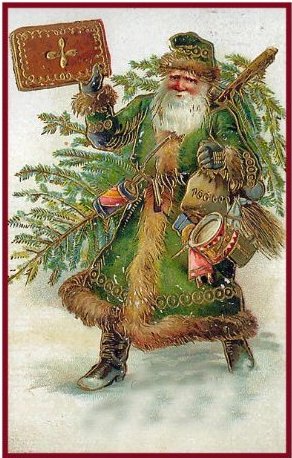


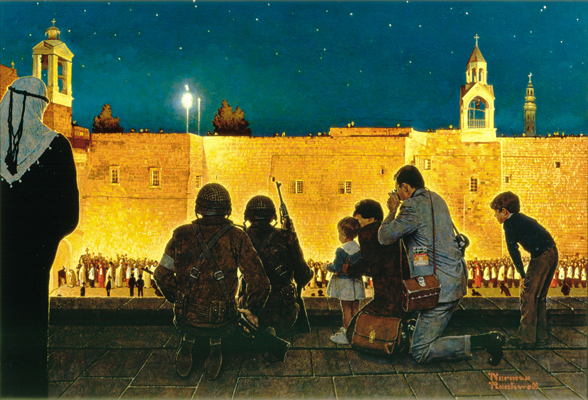
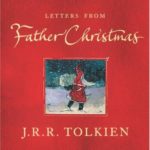
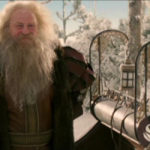
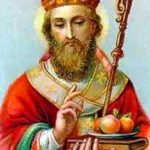




Timothy, this is such a great post! Thank you for the review of the development of the Santa Claus folktale. It really is good to know that somebody didn’t dream him up to make people forget that Christmas celebrates Christ’s first advent.
Also, thank you for sharing your own story. So powerful! I really love the witness to what a focus on Christ can do. May we all, wherever we are, voluntarily shift our eyes to our Messiah and enjoy the peace He brings.
Becky
I love this. This is the first Christmas my eldest has not really believed in Santa, but I hope this kind of story might help retain some of the magic of Christmas.